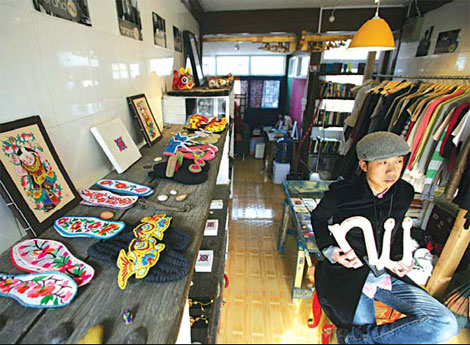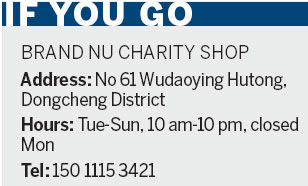
|
 Nathan Zhang owns the charity shop of Chinese handicrafts and used books, clothes and other items. Zou Hong / China Daily |
It looks exactly like other handicraft shops in a traditional Chinese hutong, or alley, except that each item has a story.
The city's first-of-its kind charity shop, owned by Nathan Zhang, sells Chinese handicrafts along with used books, clothes and other items.
The concept is that proceeds from what is sold are donated to help rural women in China.
"Many NGOs produce their own stuff but don't have a place to sell it," said Zhang, who returned to Beijing in 2008 after working in Canada for nearly a decade in the telecommunications sector.
"A rural women's group tried to open a little shop but only sold two things. When they put their products in my shop, everything sold out."
Located in Wudaoying Hutong in Dongcheng district, Brand Nu's walls are lined with handicrafts from a number of different nongovernmental organization supported projects aimed at benefiting women across the country through economic empowerment and cultural education.
There are hand-embroidered purses from Ningxia province, tiny animal dolls from Shandong, woven sandals from Guizhou and tailored jackets from Sichuan.
The other half of the space is filled with almost mint condition clothes that have been donated from the Beijing community.
The jackets, dresses, tops and pants sell for around 30 yuan ($4.40) each.
Zhang is also working with a local Scottish designer to create a clothing line made from the fabric of second-hand garments.
Most of the funds Brand Nu generates are funneled directly to the Beijing Cultural Development Center for Rural Women. The NGO offers a number of programs for impoverished women, including literacy classes, support networks and mental health education.
Zhang is collecting books and raising money to help the NGO build a library near Beijing.
He plans on expanding his product line soon as well, engaging more disadvantaged women to make sweaters, soaps and other items that he can sell in Beijing to help raise their socioeconomic status in the countryside.
Yet with aspirations come worries. Right now Zhang is operating on a shoestring budget and looking for work on the side to support both his business and his family.
But the cause is important and his business hopefully sustainable.
"It is a big risk," he said. "I don't have any income. But this little shop gives me the space to do my thing and to help people. I am not worried."
"I wanted to do something meaningful," said Zhang. "If you can help one woman, you can help an entire family."
